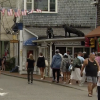This week, New York City became the first major city in the U.S. to require proof of vaccination to enjoy activities like dining indoors and working out in gyms. So far, Massachusetts has not enacted a similar requirement. But that’s not stopping some local restaurants from taking the matter into their own hands. Here's what some restaurant owners, workers and public health officials have said on Greater Boston in the last week.
For several weeks, owner and chef Tracy Chang has required proof of vaccination for indoor dining at her Cambridge restaurant PAGU. She says that 9 out of 10 guests are supportive and appreciative of the requirement.
“We wanted to take the right precautions and do the right thing,” she said. “It’s not a common practice now in Massachusetts, and we’re hoping that changes, especially as the Delta variant grows more perilous.”
WATCH: Tracy Chang on requiring vaccination proof at PAGU
Bob Luz, president and CEO of the Massachusetts Restaurant Association, said that he’s concerned that asking for proof of vaccination puts a burden on restaurant workers, who have already had to police masking and social distancing policies throughout a difficult year.
“We don’t believe the government should put enforcement abilities on under-staffed and over-stressed restaurant employees,” he said.
At Jacques Cabaret in Boston, proof of vaccination for employees has long been required, and now customers have to show proof, too. If they can’t, they must wear a mask. James Gracik, a producer at Jacques Cabaret, said the policy makes him feel safer.
“I’m very happy that I work for an establishment that was willing to take safety first,” he said.
Cambridge’s Club Passim put a proof-of-vaccination requirement in place on Wednesday. Those who can’t show a vaccine card, or photo of a vaccine card, will be turned away. Managing Director Matt Smith said that the early response has been overwhelmingly positive from patrons and performers, who are maskless when performing at the folk music venue.
“Everyone who’s got shows coming up in the next couple of months, 100% positive response,” he said. “The performers, the agents are all very happy with this move. The audience, I would say we are a 97% positive having us go to this policy — because people want that peace of mind when they're going out.”
Grendel’s Den in Cambridge has required customers and staff to show vaccine proof since vaccines became widely available. Unvaccinated guests are offered outdoor seating during peak hours. Because of last week’s CDC guidance about high-risk areas, all guests and staff will now be required to wear masks inside.
“We really try to give people as much leeway and as many ways as possible to indicate to us, or show us with some confidence, that they’re vaccinated,” owner Kari Kuelzer said. The proof can be the card itself, a photo of the card or the confirmation email from the vaccine appointment. “What we’re trying to be is be as proactive as possible, and reward people for their vaccination.”
Kuelzer said the policy is the right thing to do to keep staff and guests safe despite the inconvenience. Plus, restaurants already check your driver’s license if you’re drinking. “There’s a lot more personal information on your driver’s license than on your vaccination card,” she added.
WATCH: Kari Kuelzer on requiring vaccination proof at Grendel's Den
As the Delta variant spreads, public health officials are working hard to get as many people vaccinated as possible. But, without a universal mandate, businesses are navigating complicated waters of business ethics, legal questions and public health guidelines.
Some municipalities are helping businesses with vaccine mandates. In Provincetown, the site of a July outbreak, town manager Alex Morse said the town’s health department is looking at a program to offer certification from the board of health if they require all staff and patrons to be vaccinated, which could be displayed in a store window.
More Local News
“Provincetown can’t do this alone,” he said, adding that he hopes the federal government steps in soon.
Joseph Allen, an associate professor and the director of the Healthy Buildings program at the Harvard T.H. Chan School of Public Health, says that this moment calls for businesses to lead the way on vaccine mandates if the federal government won’t.
Some major companies — Apple, Google, Microsoft, Facebook and Disney — have policies requiring vaccinations, and he thinks other companies, big and small, should follow them.
“These are major companies that see that this is key to them keeping their businesses open, their employees safe, getting their customers back in and keeping them safe,” Allen said on Morning Edition, comparing this moment to March 2020 when the NBA cancelled its season at the very beginning of the pandemic. “Businesses are leading the way. The dominoes are falling on vaccine mandates.”
Some companies may be scratching their heads over the legality and ethics of requiring vaccinations.
Brian Richichi, an employment litigator at Krokidas & Bluestein LLP in Boston, says there is a subtle distinction when it comes to vaccine mandates: While employers can’t require employees to go out and get vaccinated, they can require that everyone in a workplace be vaccinated, because of the threat of the Delta variant.
“There’s nothing that would stop a private employer from requiring all its employees to be vaccinated before coming into the workplace,” Richichi said.
Art Caplan, founding head of New York University’s Division of Medical Ethics, argued it may be unethical for employers to not mandate vaccines.
"I want the employer to be worrying, first and foremost, how do I keep this workforce safe?" he said. "How do I keep the relatives, families, partners of those who work here safe? That ought to be the moral priority."
WATCH: Art Caplan on the ethics of mandating vaccines
GBH News’ Sarah Betancourt contributed to this report.









